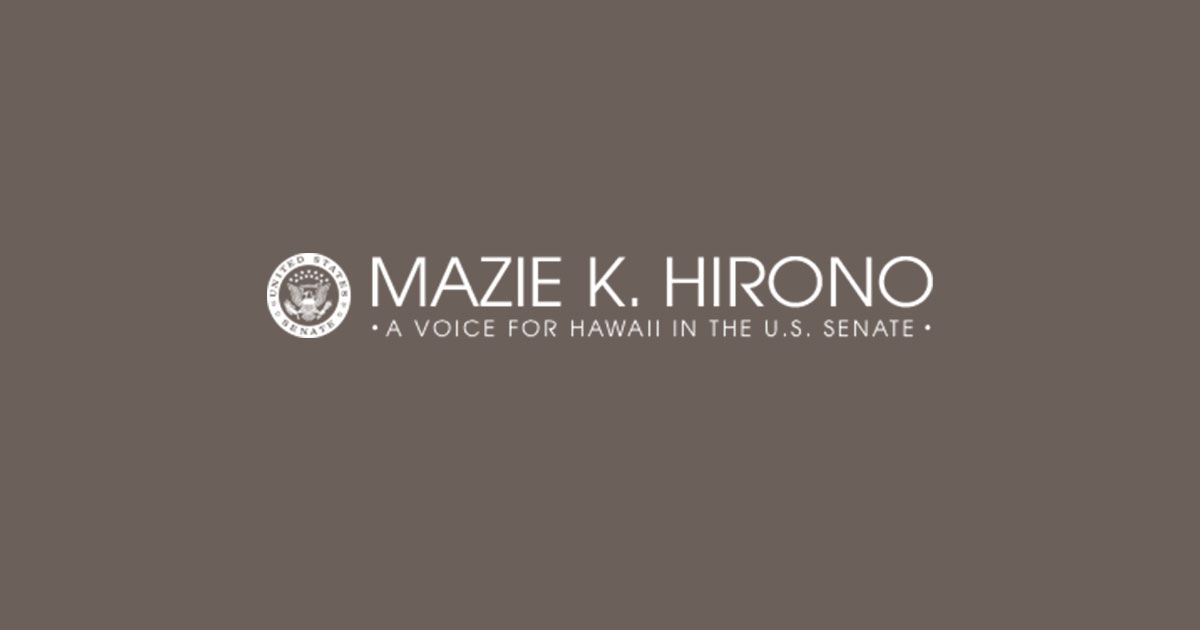Source: United States Senator for Hawaii Mazie K. Hirono
October 28, 2021
Funding supports research to combat devastating fungus threatening coffee industry
WASHINGTON, D.C. – Senators Mazie K. Hirono and Brian Schatz and Representatives Ed Case and Kai Kahele announced $6,007,090 in funding from the U.S. Department of Agriculture (USDA) National Institute of Food and Agriculture (NIFA) Specialty Crop Research Initiative (SCRI) grants program to the Synergistic Hawaii Agriculture Council (SHAC) to address Coffee Leaf Rust (CLR).
This four-year grant will support a coordinated approach to addressing CLR across various entities, including the USDA Agricultural Research Service (ARS) Daniel K. Inouye U.S. Pacific Basin Agricultural Research Center (DKI-US-PBARC), the ARS Tropical Agriculture Research Station (TARS) in Puerto Rico, University of Hawaii, University of Puerto Rico, as well as Purdue University and Michigan State University. The five main objectives of this grant include breeding rust-resistant varieties of coffee, surveying spread and identifying field management options for farmers to use to protect existing coffee trees, identifying fungicides or biological control methods to combat CLR, genomic work on CLR, and economic analyses of domestically grown coffee.
“Over the past year our more than 1,400 coffee growers in Hawaii have been dealing with one of the greatest threats to their industry,” Senator Hirono said. “This funding will help bring together leading experts in coffee research to protect one of our most iconic crops, so coffee can continue contributing to our local economy and culture.”
“This new federal funding is an important step supporting our coffee growers against Coffee Leaf Rust,” said Senator Schatz. “By developing rust-resistant coffee varieties and researching the disease to better combat it, we’ll be able to protect and maintain the unique quality of Hawaii coffee. This is great news for our state.”
“This is very welcome news especially coming on the heels of the sobering discovery this summer that coffee leaf rust has spread to all the major islands in the State of Hawaii,” said Congressman Case. “As a member of the House Appropriations Committee, I have worked to secure millions of dollars in federal research funding for Hawaii’s tropical specialty crops like coffee and macadamia nut, and while our funding has helped mitigate the effects of the macadamia felted coccid, coffee berry borer and coffee leaf rust, current law limits the scope of federal research dollars. The members of our Hawaii Congressional delegation last month introduced bicameral legislation to continue to battle these agricultural pests to greatly enhance our ability to fund much more comprehensive coffee as well as macadamia nut research to preserve and grow these invaluable industries.”
“The success of Hawaii’s coffee industry has been a priority of mine since my tenure in the State Senate, and now as a U.S. Congressman. Our coffee industry circulates more than $200 million annually in the local economy creating business and job opportunities back home,” Congressman Kahele said. “I applaud the team of dedicated scientists, farmers, project managers and others who crafted the award-winning Specialty Crop Research Initiative application and send my thanks to Suzanne Shriner, Executive Director of the Synergistic Hawaii Agriculture Council, for her leadership in securing federal dollars to address the coffee leaf rust.”
Synergistic Hawaii Agriculture Council Director Suzanne Shriner said, “Many of us depend on our morning cup of coffee to start the day. But for the growers of Hawaii and Puerto Rico, coffee is much more than a drink, it’s a part of the culture and a significant economic driver. The recent arrival of the deadly Coffee Leaf Rust fungus has the potential to devastate the industry. The NIFA grant will fund a consortium of scientists and address the problem on the ground for farmers in both regions. Research will focus on immediate solutions for growers affected by CLR, through field management of the disease. In addition, the grant will fund long-term breeding of trees resistant to CLR, focusing on quality in the cup to meet the high standard of Kona and Hawaiian coffees. In addition, expansion of genomic research will assist the global coffee industry in understanding and combating the fungus. Finally, economic analyses of all activities will help our growers, large and small, determine which solutions are best for their farms. SHAC is looking forward to collaborating with the scientists of USDA, University of Hawaii, Purdue, University of Puerto Rico and Michigan State University. We believe this team is uniquely capable of answering the challenging questions that this disease raises.”
CLR is a devastating fungus that up until last year was present in every coffee growing region of the world except Hawaii. It was first detected in Hawaii in October 2020 and its presence has since been confirmed on all main Hawaiian Islands. Spread of the fungus is difficult to control and if left untreated can result in more than 70 percent yield loss.
Upon learning of detection of CLR in Hawaii last year, Senator Hirono, Senator Schatz, and Rep. Case sent a letter to then-USDA Secretary Perdue alerting him to the situation and requesting swift federal assistance with early detection and rapid response. In addition, the Hawaii delegation introduced the Coffee Plant Health Initiative Amendments Act earlier this year that would expand research funding to address all current and emerging threats to coffee plant health, including CLR.
